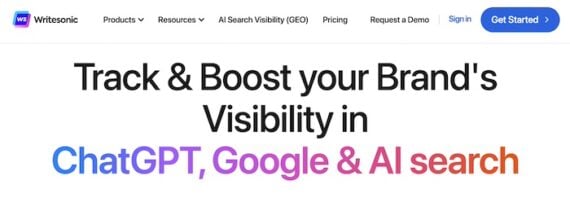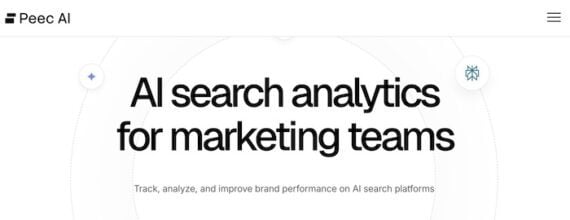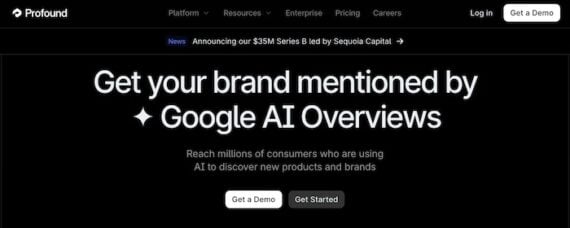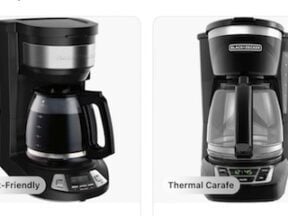AI-powered search is a new way for shoppers to discover products. ChatGPT, Perplexity, Claude, Gemini, and even AI Overviews answer shopping-related questions directly — no additional clicks required.
For brands, that’s a double-edged sword. The good news is the potential for additional exposure. The challenge is replacing organic search traffic (see the Semrush study) and surfacing the company and its products in those AI-generated answers.
A growing set of generative engine optimization (GEO) tools promises to fix this problem by measuring and improving how products and brands appear in the responses.
Few GEO platforms offer SKU-level capability — tracking and optimizing individual products in AI answers. Most focus on page-level optimization and citations, making it difficult to bulk update products with optimized content.
Nonetheless, I recently evaluated over a dozen of these GEO platforms to see which are viable for small and mid-sized businesses. Below are three recommendations with use cases, overviews, and limitations.
GEO Tools for SMBs
Writesonic
Writesonic focuses on product page optimization. It lets merchants rewrite and optimize (for genAI) individual product pages or articles, to then publish directly to Shopify, BigCommerce, or WordPress.
Here’s the workflow:
- Identify target pages. Manually select SKUs with poor organic search traffic, using Search Console, Shopify analytics, or other SEO tools.
- Analyze in Writesonic. Paste product page content into Writesonic or connect via API.
- Optimize with content metric. Edit the pages in real time with Writesonic’s Content Score metric.
- Update product pages. Export and publish optimized content, including metadata and formatting, to the ecommerce platform, keeping metadata and formatting intact.
Overview
- Pricing: Tiered plans start at $49 per month.
- Ease of use: Self-service, minimal learning curve.
- Integrations: Direct with WordPress; export for Shopify and BigCommerce.
- Content optimization: Strong, with rewrites of product pages and articles.
Limitations
- Does not surface underperforming SKUs on its own.
- No historical performance tracking.
- No SKU-level competitive benchmarking.
Peec AI
Peec AI provides competitive benchmarking, showing merchants where their products and brands appear in AI-generated answers and how they compare to competitors. Peec AI doesn’t (yet) create or publish content, but its SKU-level gap analysis can guide optimization.
To use:
- Identify visibility gaps. Track which prompts cite your brand and products, and those of competitors.
- Analyze competitors. Monitor competitor product visibility at the SKU level for missed opportunities.
- Export data. Pull CSV files (or link via API) to feed into your search engine, content, or analytics tools.
- Refine on-page content. Update product pages in Shopify, BigCommerce, or other platforms, closing identified gaps.
Overview
- Pricing: Tiered plans start at €89 per month ($103)
- Ease of use: Simple dashboards; quick start.
- Integrations: No direct cart integrations.
- Content optimization: Monitoring only; no optimization tools.
Limitations
- Does not optimize or publish product content.
Profound
Profound is primarily a measurement platform, monitoring how brands appear across AI-powered search engines. It doesn’t optimize or publish content, but it offers deep discovery and measurement capabilities that can inform SKU-level strategy.
To use:
- Identify visibility gaps. Use Profound’s dashboards to track your products, categories, or brand in AI answers.
- Analyze competitors. Benchmark against competitors to pinpoint missed opportunities and find high-impact prompts to target.
- Surface related prompts. Filter by geography, category, or topic to find prompts that align with your products for potential conversions.
- Use insights to optimize content. Export reports or integrate with analytics and SEO tools to guide on-site optimization.
Overview
- Pricing: $499 per month with custom plans available.
- Ease of use: Training required to interpret fully.
- Integrations: No direct ecommerce cart integrations.
- Content optimization: None. Focus is on measurement.
Limitations
- Does not optimize or publish product content.
Getting Started
Merchants do not require expensive tools to improve genAI visibility. To start:
- Audit your presence. Use free trials or affordable tools such as Peec AI to see how your products appear in AI answers.
- Identify high-intent prompts. Ask the genAI platforms, “Identify the most common customer questions about [product/category] by analyzing Reddit, Quora, product reviews, support tickets, and forums.”
- Start small. Pick a half-dozen products and categories to track monthly. Adjust and expand over time.
AI may produce first-time customers, but loyalty programs, email marketing, and standout service will bring them back.







